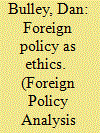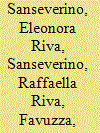|
|
|
Sort Order |
|
|
|
Items / Page
|
|
|
|
|
|
|
| Srl | Item |
| 1 |
ID:
176911


|
|
|
|
|
| Summary/Abstract |
Digital platforms increasingly propose business models that improve economic organisation -by better coordinating supply and demand under imperfect information- and attain higher efficiency levels. At the same time, the energy generation gradually reshapes into decentralised network with lower capacity, but able to manage demand and supply in real-time. However, the penetration of online platforms within the energy sector poses policy questions that are specific to platforms' business models. This study investigates a sample of 217 digital platforms running energy-related activities across the EU regional markets. These energy platforms make about 20% of the world energy platforms. By observing their characteristics and those of their surrounding markets, it appears that the digital platforms in the European energy sector still tend to be relatively small and concentrated in specific regions, often in the neighbourhood of capital cities. Furthermore, the quantitative analysis suggests that market size, digital readiness and regulatory quality are the most important features relating to platforms' presence in the EU regional markets. This paper offers empirical evidence and reflections to provide energy policy with key information to best ripe the potential of new technologies while being aware of their inherited complexities.
|
|
|
|
|
|
|
|
|
|
|
|
|
|
|
|
| 2 |
ID:
131061


|
|
|
|
|
| Publication |
2014.
|
| Summary/Abstract |
This article notes that while ethics is increasingly talked of in foreign policy, it remains a blindspot for foreign policy analysis (FPA). It argues that this must be rectified through a critical approach which conceptualizes foreign policy as ethics. The first section examines how even constructivist approaches, which are highly attuned to the intersubjective sphere, still generally avoid dealing with morality. The second section looks at the possibilities and limits of one piece of constructivist theorizing that explores the translation of morality into foreign policy via "norms." This demonstrates the problems that a constructivist account, with its tendency toward explanatory description without evaluation, will always face. The final section argues, through an examination of EU foreign policy (from 1999 to 2004) and its innovative use of "hospitality," that FPA must critically reassess the value of the norms and principles by which foreign policy operates in order to suggest potentially more ethical modes of encounter.
|
|
|
|
|
|
|
|
|
|
|
|
|
|
|
|
| 3 |
ID:
128043


|
|
|
|
|
| Publication |
2014.
|
| Summary/Abstract |
Based on a recent technical-economical analysis on the island of Pantelleria, a policy feasibility study for a complete upgrading of the energy system of this Mediterranean Island is carried out. Pantelleria, situated between Sicily and Africa, owns a large potential in terms of renewable energy resources, although there are some obstacles in turning it into a Near Zero Energy system. Starting from a deep energy system audit, the study proposes the project for a near zero energy island, through the efficient transformation of the different existing natural energy resources into electrical energy and heat: the solar, the wind-based and the geothermal systems. In this way, the island can be turned into an almost autonomous system. The main difficulties connected to the implementation of the project can be identified in the national energy policies as well as in the specific local situation, characterized by a strong private monopole on generation and distribution of electrical energy which has no incentive for supporting the costs connected to the energy requalification of the island. On the other hand, the local administrations, involved in the project through bottom-up European policies, do not have the cultural and economic tools to go on with the implementation
|
|
|
|
|
|
|
|
|
|
|
|
|
|
|
|
|
|
|
|
|